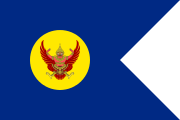Sukhumala Marasri
| Sukhumala Marasri | |
|---|---|
| Queen consort of Siam | |
 | |
| Born |
10 May 1861 Grand Palace, Bangkok, Siam |
| Died |
9 July 1927 (aged 66) Bang Khun Phrom Palace, Bangkok, Siam |
| Spouse | Chulalongkorn |
| Issue |
Princess Suddha Dibyaratana Prince Paribatra Sukhumbhand |
| House | Chakri Dynasty |
| Father | Mongkut |
| Mother | Samli Bunnag |
| The Four Consorts of King Chulalongkorn | ||||||||
|---|---|---|---|---|---|---|---|---|
|
Sukhumala Marasri (Thai: สุขุมาลมารศรี; rtgs: Sukhumanmarasi; 10 May 1861 – 9 July 1927) was a daughter of King Mongkut (Rama IV) and his concubine, Samli (เจ้าคุณจอมมารดาสำลี). Her given name was Princess Sukhumala Marasri (พระองค์เจ้าสุขุมาลมารศรี). She was later one of the four consorts of King Chulalongkorn (Rama V) and was also his half-sister.
Early life
Sukumala was born in Royal Grand Palace on 10 May 1861. She was the 52nd child of King Mongkut. Her mother was consort Samli. She had 5 full siblings, including the famous Princess Napaborn, and from her father's side she was a half-sister to King Chulalongkorn (later her husband), Queens Sunandha Savang Vadhana, and Saovabha.
When she was ten years old, King Mongkut died and was succeeded by Sukhumala Marasri's half-brother, Prince Chulalongkorn.
Life as queen
Sometime in her teenage, Sukhumala became a royal wife to King Chulalongkorn. The marriage produced two children; Princess Suddha Dibyaratana (later the Princess of Ratanakosin), who was also the first surviving Chao-Fah, a child of the sovereign which their mother is the Queen Consort or a Princess by blood, and Prince Paribatra Sukhumbhand (later the Prince of Nakorn Sawan.) In her husband's reign she served as the King's secretary and was referred to as "the Princess Consort".
After her husband died, she moved to her son's palace, Bang Khun Prom. During the reign of King Vajiravudh, her nephew, he officially named her as his father's fourth queen consort, making her official title Her Majesty Queen Sukhumala. When Prajadhipok succeeded to the throne, he gave his father's two surviving queens consort, Savang Vadhana and Sukhumala, the title of "the Queen Aunt". In the same style Sukhumala was preceded by Savang Vadhana, reflecting the fact that Savang Vadhana was created queen consort by Chulalongkorn before Sukhumala.
Queen Consort Sukhumala Marasri died on 9 July 1927 at the age of 66 at the Bang Khun Prom Palace (H.R.H. Prince Paripatra Sukhumbhand Palace). Her only surviving child, Prince Paripatra Sukhumbhand, and her younger full sister, Princess Napaborn, were at her bed side.
Aftermath
In her memory, one district was named "Rajdhevi" after Sukumala.
When Prahadhipok abdicated and was successed by his nephew, Ananda Mahidol in 1935, Sukumala was no longer aunt to the new king, thus she was simply referred to as Her Majesty Queen Sukumala Marasri thereafter. Unlike her younger-half sister, Savang Vadhana, who was created "the Queen Grandmother", There is no posthumously created for Sukumala as she was died several years ago.
Her son, Prince Paripatra was a prominent figure in Siamese political, often referred and credited as the man behind (Prachadhipok's) throne. The prince served as the regent at the time of Siamese revolution occurred, and was captured by Khana Ratsadon. Prachadhipok accepted to become the constitution monarch, but Prince Paripatra had to exiled. He died at Indonesia, never to back to his homeland again. M.R. Sukhumbhand Paribatra is one of his grandchildren.
Sukumala's younger sister, Princess Napaborn died at the age of 94.
Titles and styles
- 1861–1881 : Her Royal Highness Princess Sukhumala Marasri
- 1881–1910 : Her Royal Highness Princess Sukhumala Marasri, Princess Consort
- 1910–1925 : Her Majesty Queen Sukhumala Marasri, Royal Consort of HM King Chulalongkorn
- 1925–1927 : Her Majesty The Queen Aunt
Thai Royal Decorations
-
_ribbon.png) The Most Illustrious Order of the Royal House of Chakri
The Most Illustrious Order of the Royal House of Chakri -
_ribbon.png) The Ancient and Auspicious of Order of the Nine Gems
The Ancient and Auspicious of Order of the Nine Gems -
_ribbon.png) Dame Grand Cross (First Class) of The Most Illustrious Order of Chula Chom Klao
Dame Grand Cross (First Class) of The Most Illustrious Order of Chula Chom Klao -
_ribbon.png) King Rama IV Royal Cypher Medal (Second Class)
King Rama IV Royal Cypher Medal (Second Class) -
_ribbon.png) King Rama V Royal Cypher Medal (First Class)
King Rama V Royal Cypher Medal (First Class) -
_ribbon.png) King Rama VI Royal Cypher Medal (First Class)
King Rama VI Royal Cypher Medal (First Class) -
_ribbon.png) King Rama VII Royal Cypher Medal (First Class)
King Rama VII Royal Cypher Medal (First Class)
References
- Paul M. Handley, "The King Never Smiles" Yale University Press: 2006, ISBN 0-300-10682-3
See also
| |||||||||||||||||||||||||||||||||||||
| ||||||||||||||||||||||||||||||||||||||||||||||||||


